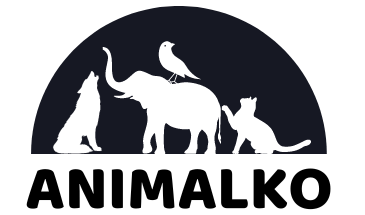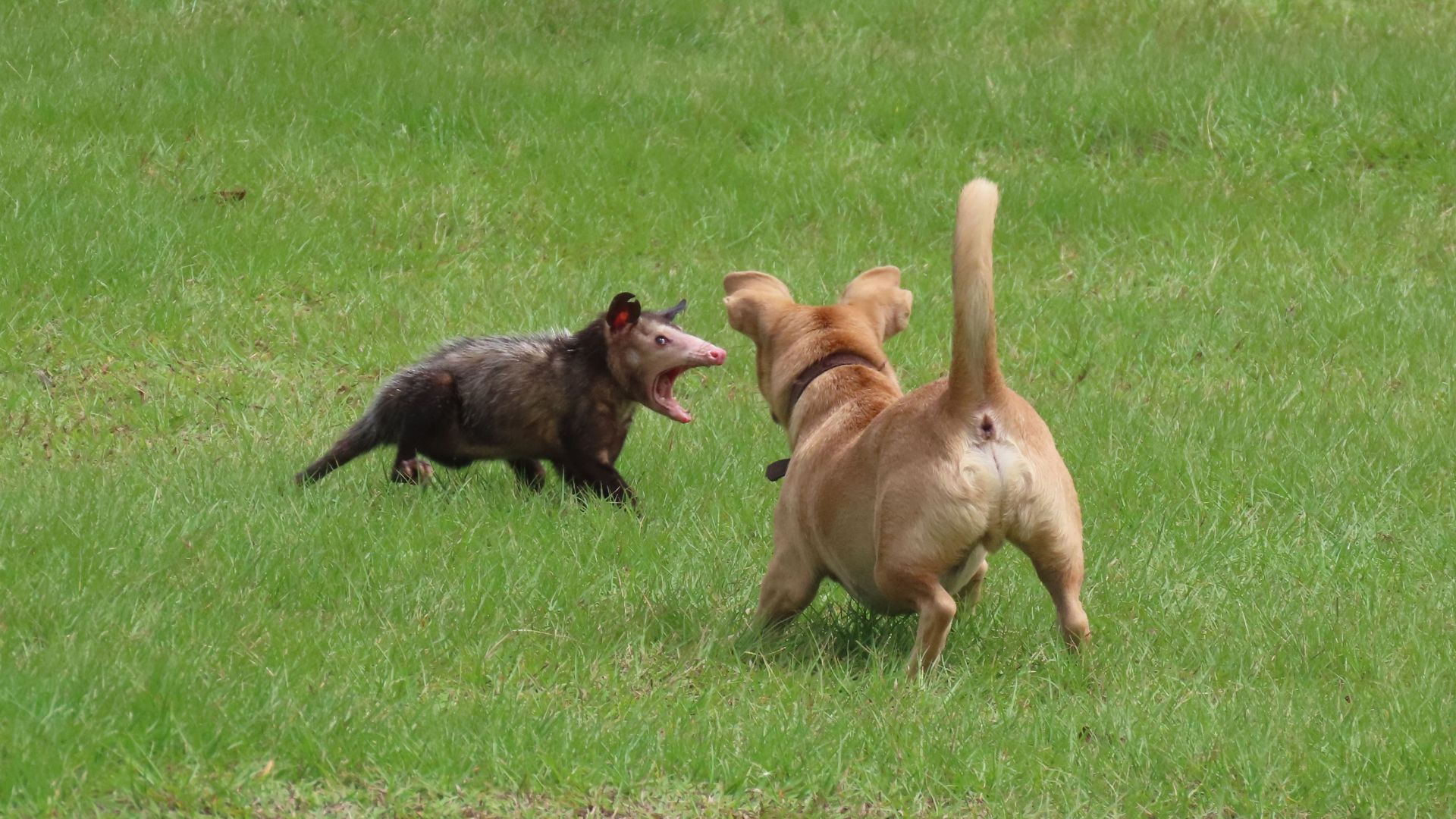Are opossums wreaking havoc in your backyard? While they’re generally harmless, these nocturnal creatures can cause a mess by rummaging through trash and gardens. Even when we’re careful, certain scents can still attract opossums to our yard.
Fortunately, nature has its ways of keeping them at bay. Here’s a list of animals that can effectively scare off opossums and help protect your property. From domesticated pets to wild predators, these creatures instill fear in opossums, making your yard less inviting for these night wanderers.
1. Dogs

Dogs are among the most effective deterrents for opossums. Their territorial nature and keen sense of smell allow them to detect intruders long before humans can. A barking dog can easily scare away opossums, as these creatures prefer to avoid confrontation.
Larger breeds, particularly those known for guarding, such as German Shepherds or Rottweilers, are especially effective. These dogs see opossums as threats to their domain and will not hesitate to chase them away.
Having a dog patrolling your yard not only deters opossums but also offers companionship and security. Train your dog to recognize opossums and discourage them from attacking, as opossums are generally not aggressive.
Instead, they prefer the ‘play dead’ tactic when threatened. Providing your dog with an outdoor shelter can encourage them to spend more time outside, thereby increasing the likelihood of opossum deterrence. Always ensure your pet is safe and vaccinated, as wild animals can carry diseases.
2. Coyotes
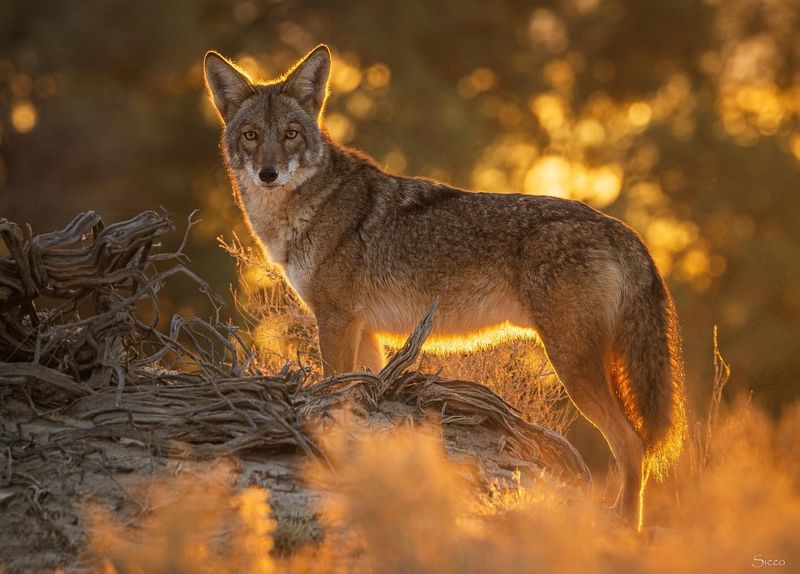
Coyotes are natural predators of opossums and can effectively scare them away. These adaptable creatures roam both rural and urban environments, often coming out at night, the same time opossums are active.
Their presence alone is often enough to keep opossums at bay, as opossums can sense the threat of a coyote nearby and will choose to move on to safer areas. Coyotes have an acute sense of smell and hearing, allowing them to detect opossums from a distance.
Unlike dogs, they do not need to bark or make noise to alert opossums of their presence. Instead, their silent, stealthy approach makes them an even more daunting threat to opossums. While coyotes can serve as effective deterrents, they can also pose a risk to pets and small livestock.
It’s essential to maintain a balance, ensuring that while coyotes help in keeping opossums away, they don’t threaten the safety of other animals on your property.
3. Foxes
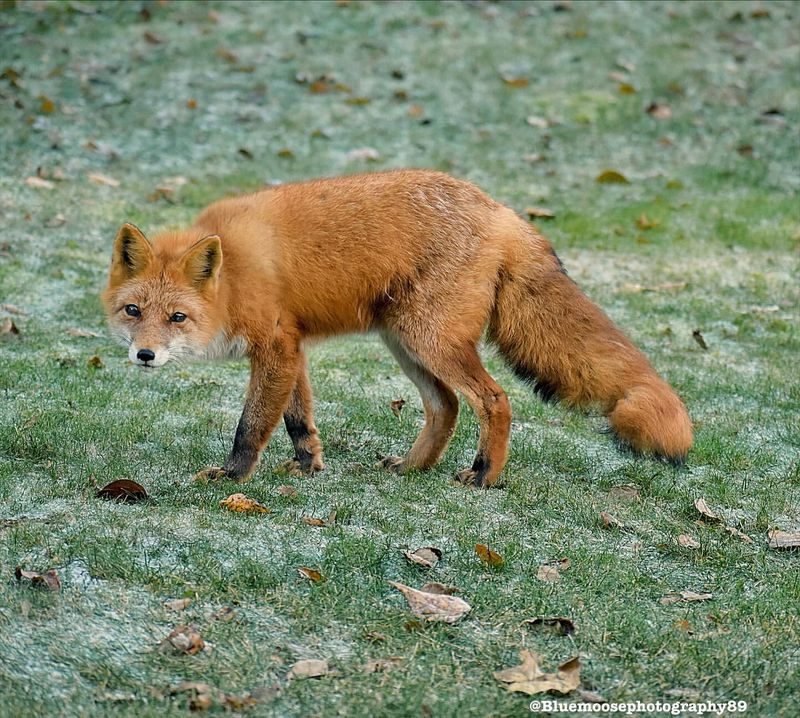
Foxes are agile hunters with a taste for small mammals, including opossums. Their intelligence and adaptability make foxes effective in scaring off opossums from your property. Foxes are known to inhabit both urban and rural areas, often creating dens in secluded spots.
The scent markings of a fox can be enough to deter opossums, who associate the smell with danger. Foxes prefer hunting alone, using their sharp senses to track and catch prey. An opossum will likely avoid any territory marked by a fox to prevent becoming the fox’s next meal.
While foxes are effective in controlling opossum populations, they generally stay away from humans.
Encouraging a fox-friendly environment, such as preserving some natural brush or leaving out occasional food scraps, can increase their presence, indirectly helping to protect your property from opossums. Of course, maintaining a safe distance from these wild animals is crucial.
4. Bobcats
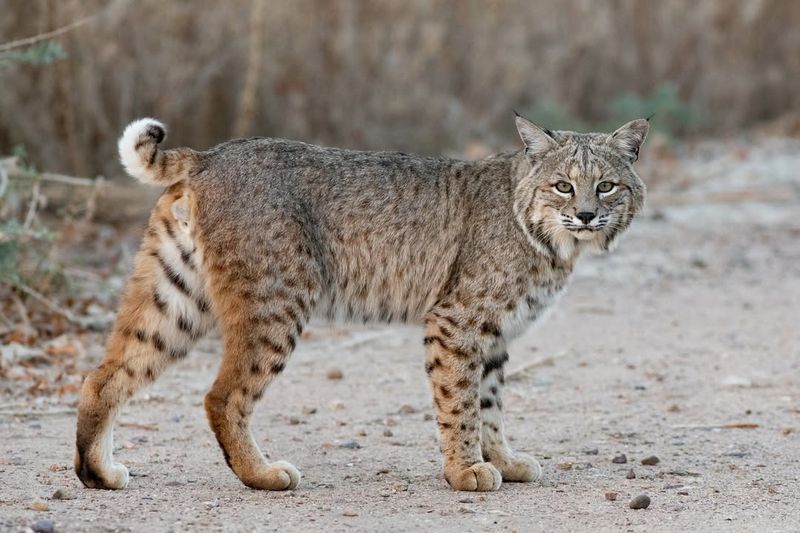
Bobcats are fierce predators native to North America, known for their strength and agility. Their predatory nature makes them highly effective at scaring off opossums. These solitary animals hunt at night, making them perfect natural deterrents against nocturnal creatures like opossums.
With their powerful build and keen hunting skills, bobcats pose a significant threat to opossums. Opossums will likely avoid territories where bobcats are known to roam, as a confrontation could be fatal. Bobcats utilize stealth and patience to capture prey, further increasing their effectiveness as a deterrent.
However, bobcats can also pose a threat to pets and small livestock. If your property is located in an area where bobcats are present, extra precautions such as secure fencing and keeping pets indoors at night can help balance the benefits of having these natural predators around. Bobcats are generally elusive and prefer to stay clear of human activity.
5. Raccoons
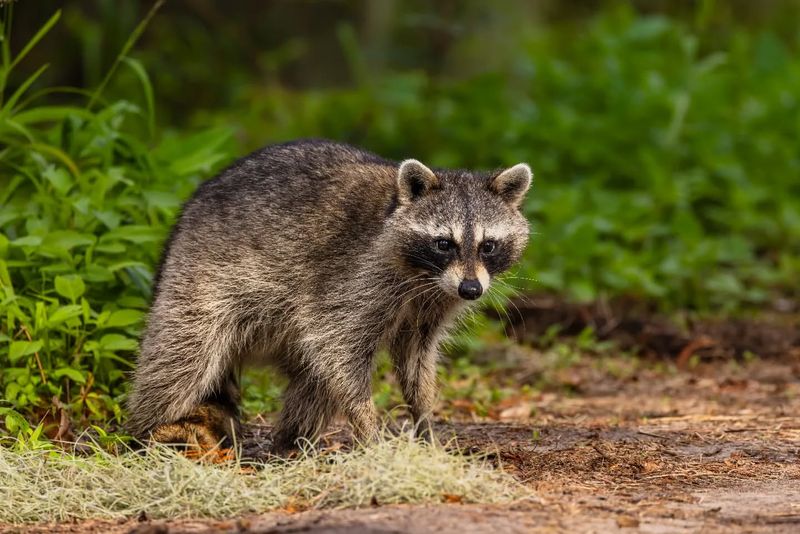
Raccoons, with their masked faces and dexterous paws, are well-known nocturnal creatures that can scare off opossums. Both animals are often drawn to the same food sources, leading to potential conflicts when competing for resources.
Raccoons, being bolder and more aggressive, can easily intimidate opossums. Raccoons will often establish territories where they forage for food, and opossums tend to steer clear of these areas to avoid confrontation.
If you have raccoons visiting your property, they might inadvertently keep opossums at bay. However, raccoons can be nuisances themselves, known for rummaging through trash and causing damage.
To manage both raccoons and opossums, ensure your garbage is secure and pet food is not left outdoors overnight. Providing raccoons with access to natural food sources, such as a compost heap, can satisfy them without causing property damage, thereby maintaining a balance between deterrence and cohabitation.
6. Hawks
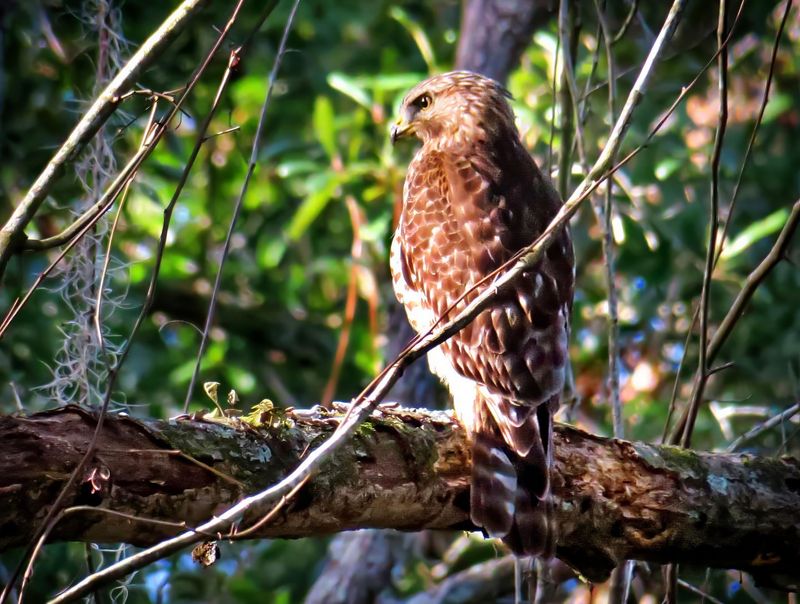
Hawks are majestic birds of prey that can contribute to scaring off opossums, especially young or small ones. With their sharp eyesight and powerful talons, hawks are effective hunters that command respect from many small animals.
Although opossums are not typical prey for hawks, the presence of these birds can still deter opossums. Hawks often patrol wide areas, keeping a vigilant eye out for potential prey. An opossum wandering in hawk territory might be mistaken as easy prey, prompting the opossum to avoid such areas.
While hawks are more likely to capture rodents or other birds, their presence in the ecosystem plays a role in maintaining a balanced food chain.
To attract hawks to your property, consider installing perches or nesting boxes. These can encourage hawks to take up residence, naturally reducing opossum presence over time. Always ensure these birds are protected, as they are vital for controlling pest populations and keeping ecosystems healthy.
7. Owls
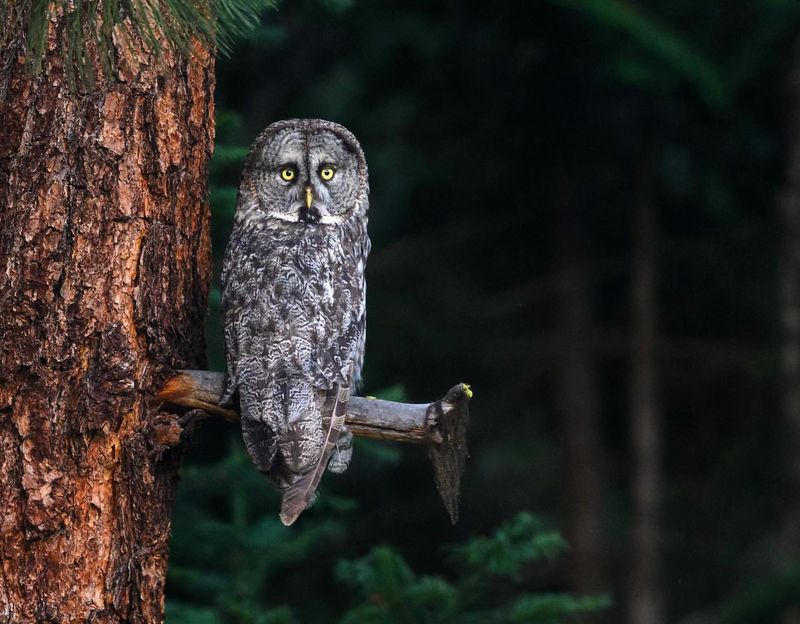
Owls are nocturnal hunters with excellent night vision and silent flight, making them effective at scaring off opossums. These birds of prey are skilled in hunting small mammals, though opossums are not their primary targets.
However, the presence of owls can still deter opossums from frequenting areas where these birds are active. Owls hunt by swooping down silently on their prey, which can be intimidating for opossums that share the same nocturnal habits.
The distinctive hoots of an owl can signal to opossums that the area is patrolled by a predator, encouraging them to seek refuge elsewhere.
Attracting owls to your property can be beneficial in controlling opossum populations. Installing owl boxes and preserving natural habitats such as wooded areas can encourage these birds to nest nearby. Providing a welcoming environment for owls can naturally decrease opossum visits, offering a peaceful coexistence with these fascinating creatures.
8. Snakes
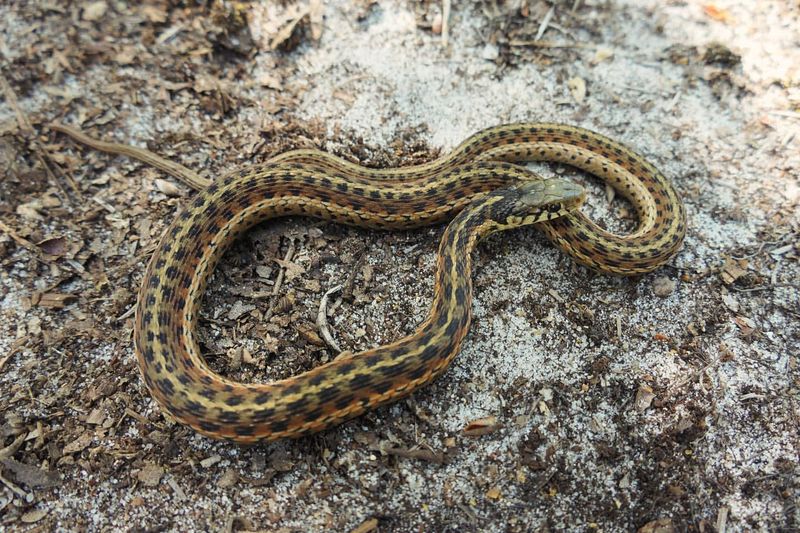
Snakes, particularly larger species, can deter opossums due to their predatory nature. While opossums are not typical prey for snakes, the mere presence of these reptiles can be enough to scare off opossums.
Snakes are stealthy and can surprise opossums, making them think twice about venturing into areas where snakes are known to inhabit. Snakes play an essential role in controlling pest populations, and their presence can contribute to a balanced ecosystem.
However, not all snakes are beneficial, and it’s important to distinguish between venomous and non-venomous species. Non-venomous snakes, such as rat snakes, are excellent at keeping smaller animal populations in check without posing a threat to humans.
Creating a snake-friendly habitat involves maintaining natural features like rock piles or log stacks. These provide shelter for snakes, allowing them to thrive and, in turn, deter opossums. It’s crucial to respect and protect these reptiles, as they are a vital part of the wildlife community.
9. Mountain Lions
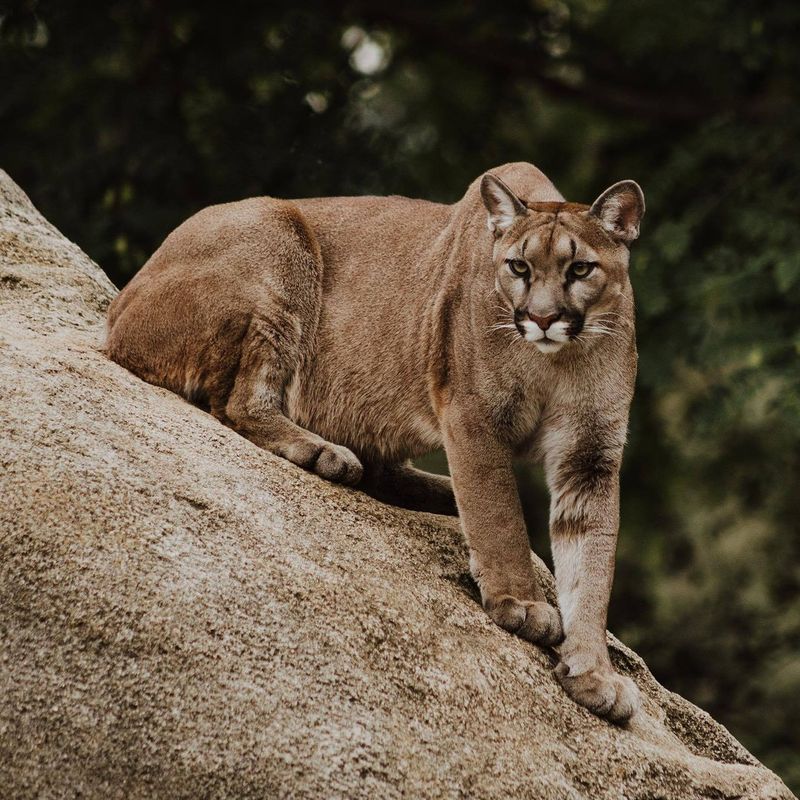
Mountain lions, also known as cougars, are apex predators with territories that can span vast areas. Their presence is a powerful deterrent for opossums, who recognize the danger posed by these big cats.
Mountain lions primarily hunt deer but will not hesitate to prey on smaller mammals if the opportunity arises. Opossums are likely to avoid regions where mountain lions are active, as they pose a significant threat.
These cats are stealthy hunters, using their agility and strength to ambush prey. The mere scent or tracks of a mountain lion can instill fear in opossums, prompting them to move to less dangerous areas. While mountain lions are effective natural deterrents, they can also pose risks to livestock and pets.
If you live in an area where mountain lions are prevalent, it’s important to take measures such as secure fencing and supervising pets outdoors. Respecting the boundaries of these majestic animals can help maintain a harmonious coexistence.
10. Weasels
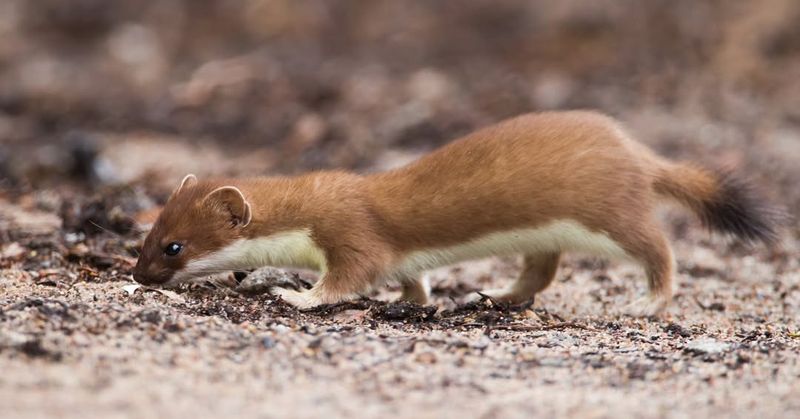
Weasels, though small, are fierce predators with a reputation for being relentless hunters. Their agility and quick reflexes make them effective at scaring off opossums. While not a common predator of opossums, weasels can still intimidate these larger creatures.
Weasels are known for their ability to squeeze into tight spaces, making them adept at hunting in burrows or dense vegetation. An opossum encountering a weasel may choose to avoid the area, as the weasel’s quick movements and bold nature can be off-putting.
Encouraging weasels to inhabit your property can help reduce opossum visits. Providing natural shelters, such as brush piles or dense foliage, can attract these small carnivores. By maintaining a habitat that supports weasels, you can enjoy the benefits of having an effective and natural opossum deterrent.
11. Large Cats (like Lynxes)
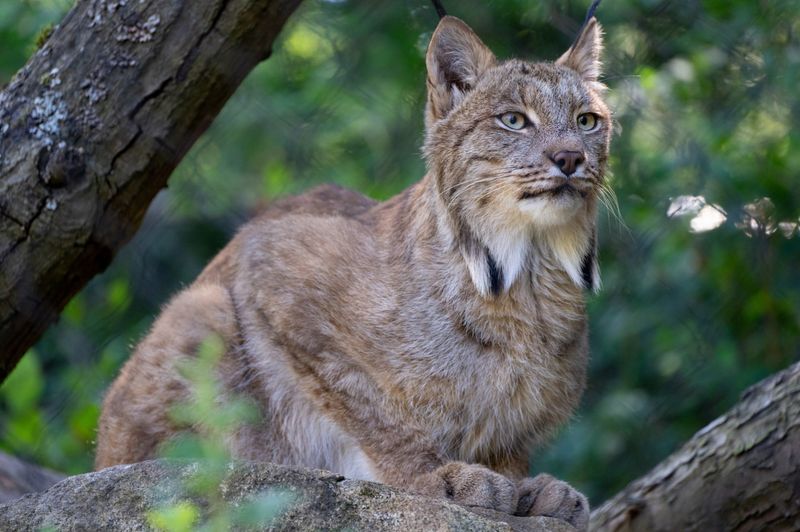
Large wild cats, such as lynxes, are formidable predators that can deter opossums from your property. These cats are known for their strength and stealth, making them effective at scaring off smaller animals.
While lynxes primarily hunt animals like hares, their presence is enough to keep opossums away. Lynxes are elusive creatures, often found in forested or mountainous regions. Opossums are unlikely to stick around in areas where lynxes roam, as these cats pose a serious threat.
The stealthy approach of a lynx can make it seem like an invisible predator, a terrifying prospect for potential prey. Creating a natural environment that supports large cats can deter opossums, but it’s important to be cautious with pets and livestock.
Proper precautions and respect for these magnificent creatures can lead to a balanced ecosystem where both humans and wildlife thrive.
12. Wild Boars
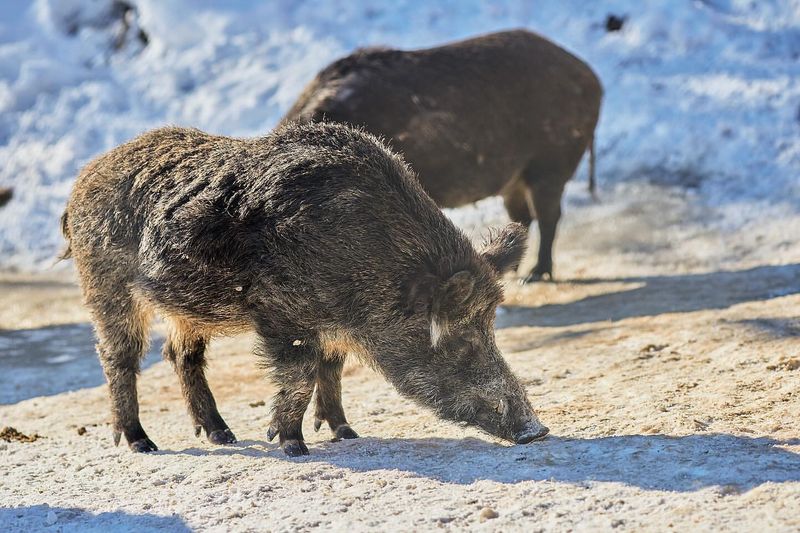
Wild boars, with their robust build and aggressive nature, can effectively scare off opossums. These omnivorous animals forage for food in a variety of habitats, often coming into conflict with other animals over resources.
Their strong tusks and social behavior make them formidable opponents, even for larger animals. Opossums are likely to avoid areas where wild boars are active, as the risk of confrontation is high.
Boars are known to be territorial and can be aggressive when threatened, making them an intimidating presence for opossums. The loud noises and movements of a group of boars can discourage opossums from approaching.
While wild boars can help deter opossums, they can also cause damage to property and crops. Managing their presence involves balancing their beneficial effects with the potential downsides, such as rooting behavior that can disrupt landscapes. Understanding their habits can help in creating solutions that leverage their deterrent capabilities.
13. Armadillos
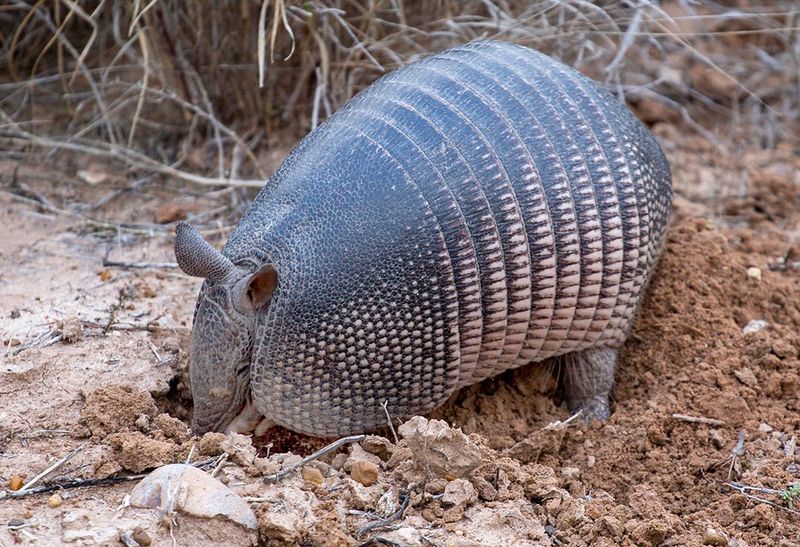
Armadillos, with their unique armor-like shells, can inadvertently scare off opossums. These creatures are not predators of opossums, but their presence can still be unsettling for them.
Armadillos forage for insects and small invertebrates, often digging in gardens or lawns, which can deter opossums from visiting the area. While opossums might not view armadillos as direct threats, the disturbances caused by armadillos foraging can be off-putting.
The rustling and digging noises made by armadillos can discourage opossums from settling in areas where armadillos are active. Although armadillos can be beneficial in deterring opossums, their digging habits can also cause damage to gardens.
Balancing the presence of armadillos involves accepting some disturbances in exchange for a decrease in opossum activity. Creating a habitat that supports armadillos, such as leaving out small logs or rocks, can help keep opossums at bay.
14. Vultures
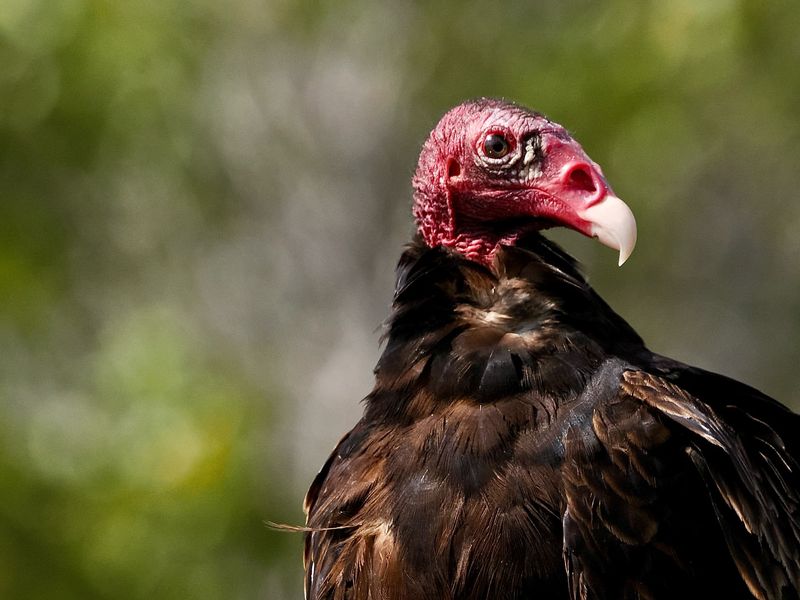
Vultures, known for their scavenging habits, can play a role in scaring off opossums. While they do not hunt opossums, vultures tend to gather in areas where carrion is present, creating an intimidating scene for opossums.
Their large size and imposing presence can make opossums uneasy. The sight of vultures circling overhead or perching nearby can signal danger to opossums, prompting them to move away in search of safer grounds.
Vultures contribute to the ecosystem by cleaning up carcasses, indirectly impacting opossum behavior by deterring them from areas with visible vulture activity. Encouraging vultures to frequent your property involves maintaining open spaces where they can easily spot food from the air.
Avoiding the use of harmful chemicals ensures that these birds can safely contribute to the balance of the ecosystem, inadvertently assisting in the control of opossum populations.
15. Kangaroo Rats
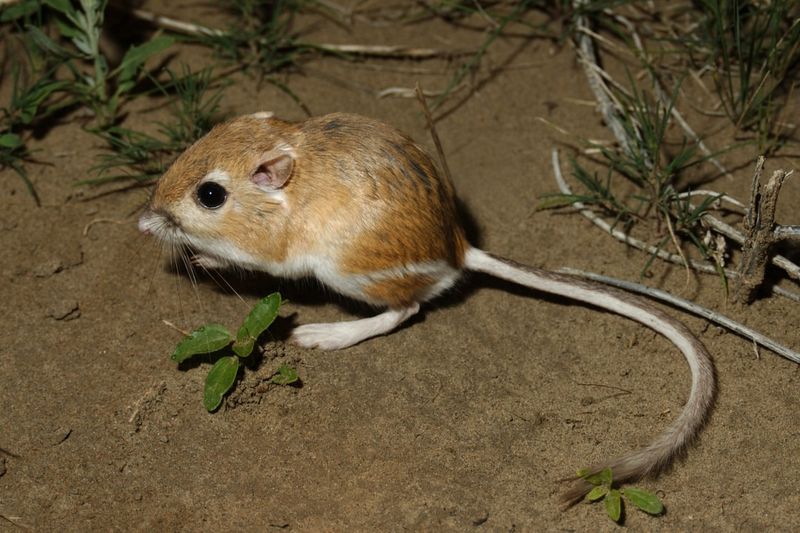
Kangaroo rats, while not predators, can indirectly deter opossums through competition. These small rodents thrive in arid environments and are known for their impressive jumping abilities. By competing for resources such as seeds and fruits, kangaroo rats can make areas less appealing to opossums.
Opossums may avoid regions where kangaroo rats are thriving, as the competition for food can be intense. Kangaroo rats are efficient foragers, often leaving little behind for other animals.
Their presence can signal to opossums that the area is already occupied, encouraging them to seek resources elsewhere. Promoting a habitat that supports kangaroo rats, like maintaining dry, open areas with native vegetation, can help in keeping opossums at bay.
These small but resourceful creatures can aid in managing opossum populations by reducing the availability of shared food sources.
16. Geese
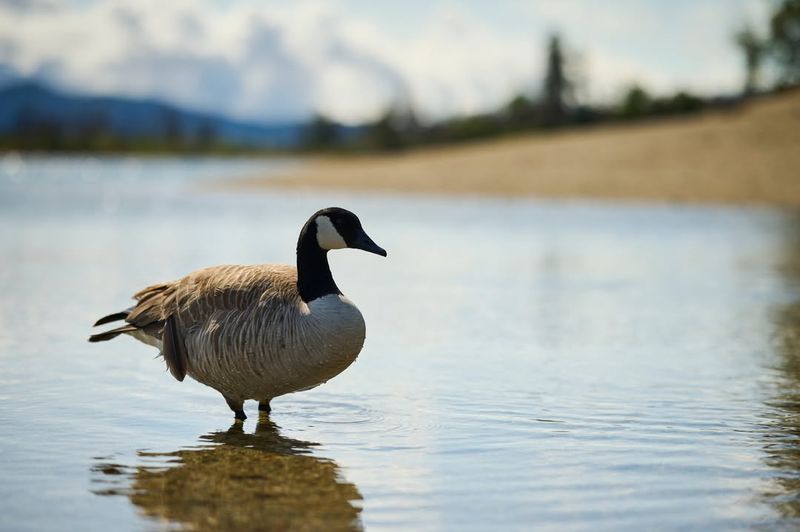
Geese are territorial birds with a strong instinct to protect their flock. Their loud honking and aggressive behavior make them effective at scaring off unwanted intruders, including opossums.
Geese are known to hiss and chase away animals that venture too close, creating a protective barrier for the area they inhabit. Opossums, being relatively timid, are likely to avoid areas where geese are present.
The noise and commotion caused by a gaggle of geese can deter opossums from attempting to enter gardens or yards. Geese are particularly effective around ponds or water features, where they feel most at home.
To use geese as a natural deterrent, consider providing a suitable water source and ample grazing area. Geese require care and maintenance, but their natural protective instincts can contribute to a decrease in opossum activity. By fostering a goose-friendly environment, you can benefit from their vigilance while enjoying their unique presence.
